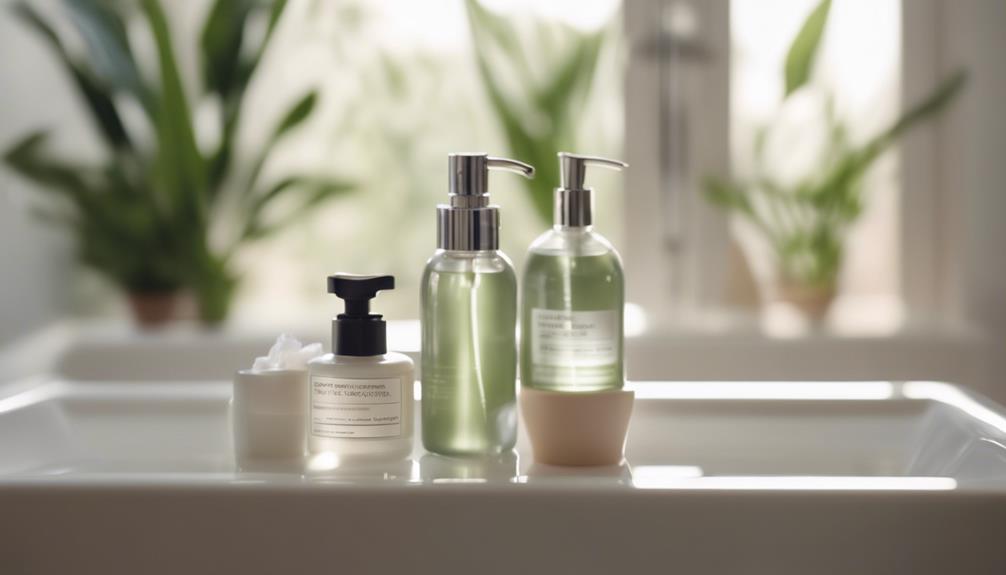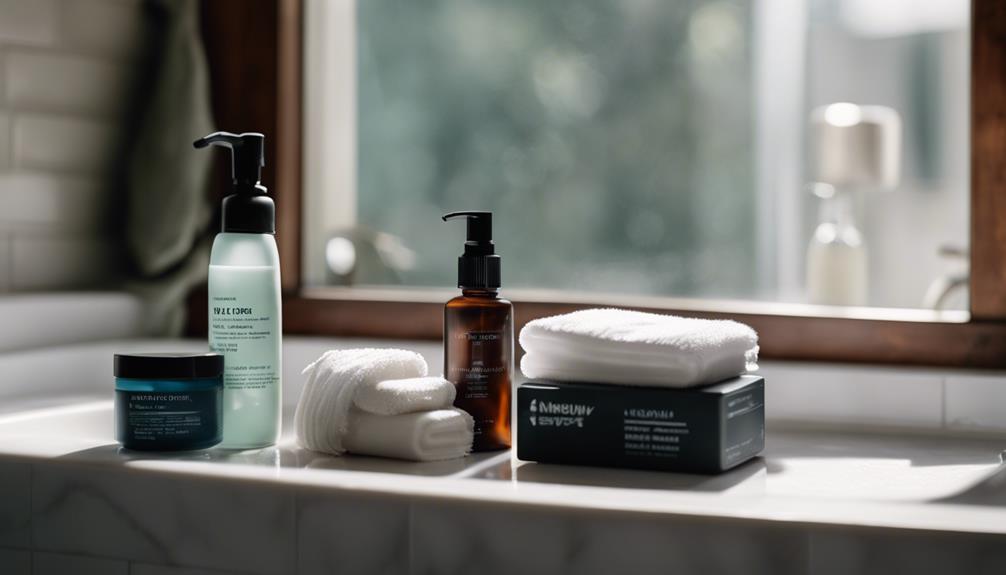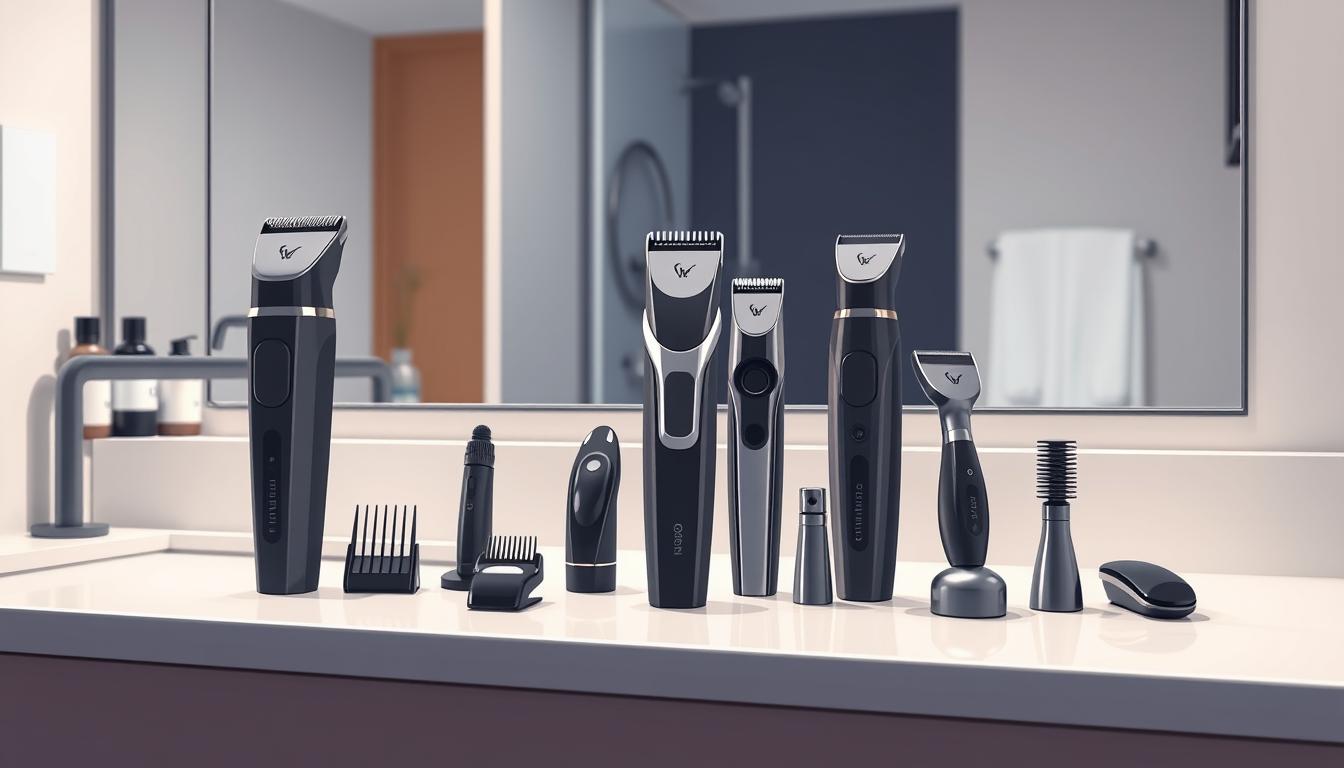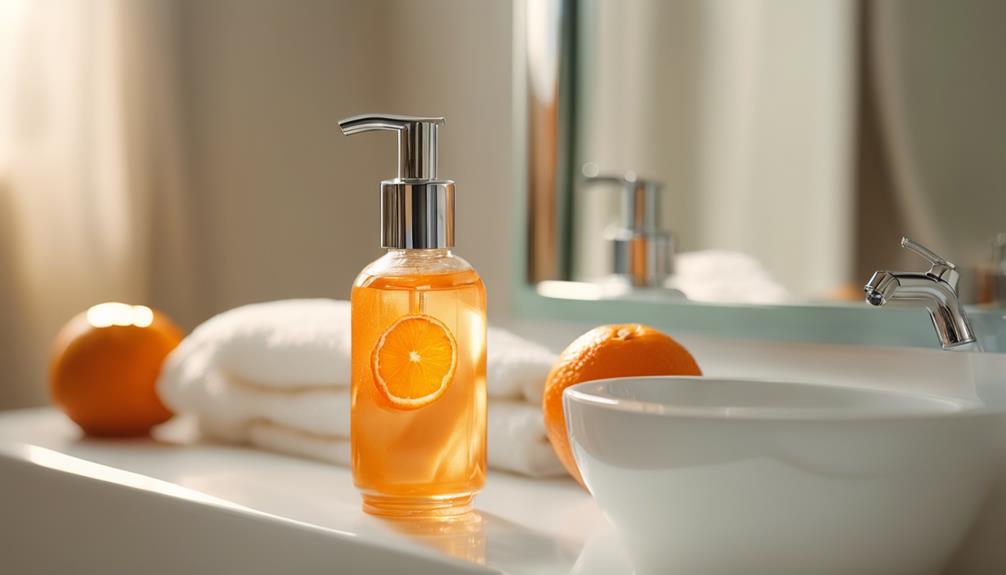To achieve clear skin, establish a consistent acne skincare routine. In the morning, use a gentle cleanser followed by a targeted treatment containing salicylic acid or benzoyl peroxide. Remember to apply an oil-free moisturizer and broad-spectrum sunscreen. In the evening, cleanse your face again, then use a treatment like adapalene before moisturizing. Stay hydrated and opt for non-comedogenic products to avoid clogging pores. Practice mindfulness to reduce stress and change your pillowcase regularly to minimize bacteria. Looking to learn more effective strategies and tips for improving your skincare routine? There are numerous options to explore for achieving clearer skin.
Key Takeaways
- Start your day with a gentle cleanser, followed by a targeted acne treatment containing salicylic acid or benzoyl peroxide.
- Moisturize daily with an oil-free, non-comedogenic product to maintain hydration without clogging pores.
- Incorporate a broad-spectrum sunscreen with at least SPF 30 into your morning routine for essential UV protection.
- In the evening, cleanse thoroughly and use retinoids like adapalene to promote skin cell turnover and prevent breakouts.
Understanding Acne
Acne is a common skin condition that affects many people, especially during puberty and young adulthood, due to a mix of hormones, bacteria, and excess oil.
It occurs when your sebaceous glands produce excess sebum, leading to clogged follicles. These clogged pores can become breeding grounds for bacteria, particularly Propionibacterium acnes, which contributes to inflammation and further aggravates the condition.
Understanding acne is vital for effective treatment and management. Hormonal changes, stress, and environmental factors can trigger flare-ups, making it essential to recognize your personal triggers.
Developing a consistent skincare routine is key to combating acne. This routine should focus on cleansing, exfoliating, and moisturizing to keep your skin balanced and reduce excess sebum production.
Causes of Acne
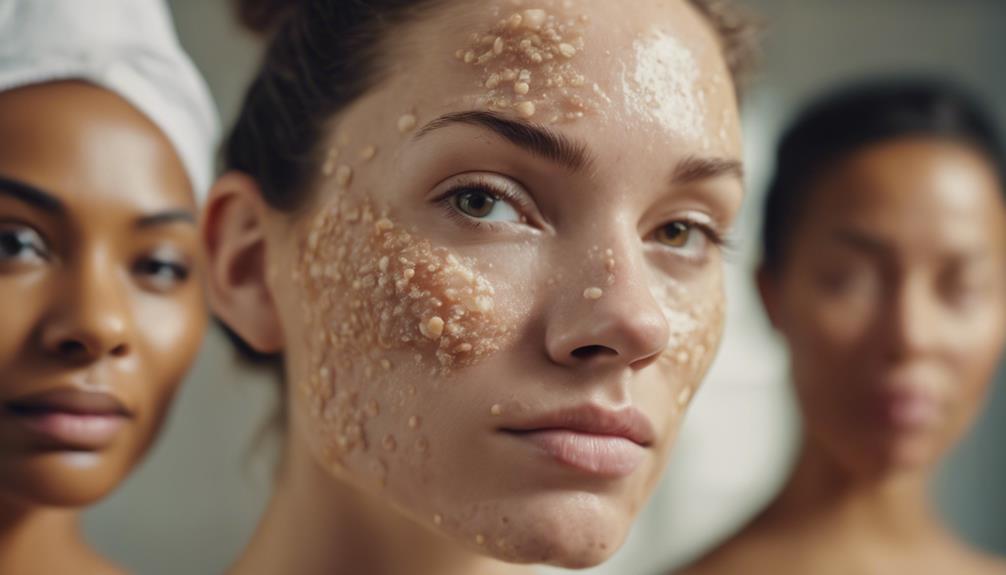
Clogged hair follicles, caused by excess oil, dead skin cells, and bacteria, are the primary culprits behind the development of breakouts. When your skin produces too much oil, it can mix with dead skin cells and create a sticky substance that clogs pores. This environment allows bacteria, particularly Propionibacterium acnes, to thrive, leading to inflammation and additionally aggravating acne.
Hormonal fluctuations play a significant role in this process. During puberty, menstrual cycles, or pregnancy, your body often produces more oil, which can trigger breakouts. Moreover, inflammation contributes to the severity of acne, making it essential to address the underlying causes.
Genetics can also determine your susceptibility to acne. If your family has a history of skin issues, you might find yourself facing similar challenges.
In addition, environmental factors like humidity, pollution, and stress can exacerbate oil production and disrupt your skin's barrier function, leading to more frequent breakouts.
Understanding these causes helps you take proactive steps in managing your acne effectively. By recognizing these triggers, you can tailor your skincare routine to combat the specific factors affecting your skin.
Importance of Skincare Routine
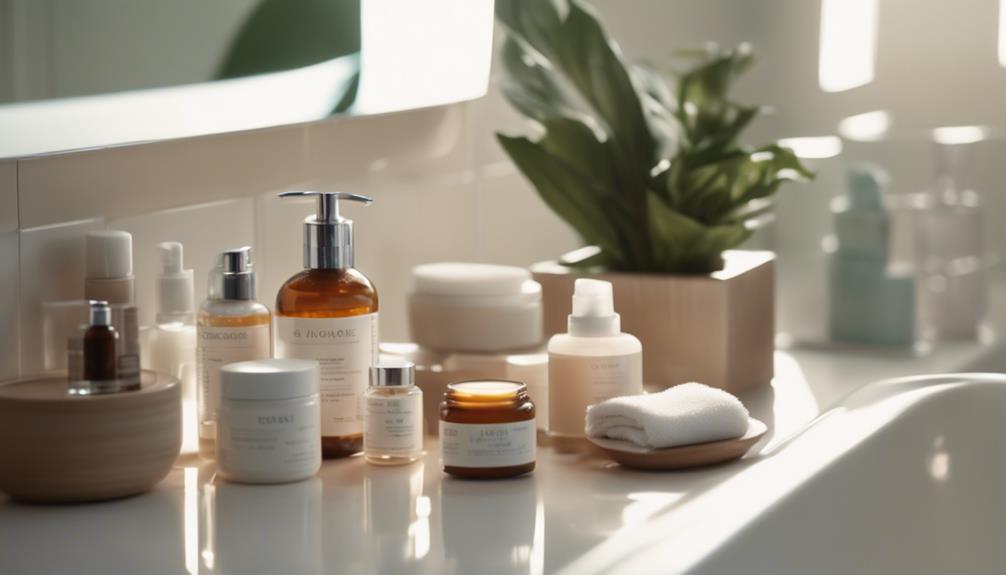
A consistent skincare routine is key to reducing breakouts and maintaining clear skin.
By selecting targeted products and ensuring daily hydration, you can effectively tackle your acne concerns.
Sticking to this routine not only helps your skin but also sets the foundation for long-term skin health.
Consistency Reduces Breakouts
Maintaining a consistent skincare routine plays an essential role in minimizing breakouts and improving overall skin health. By sticking to a daily regimen, you can achieve visible improvements in your skin within 4 to 12 weeks.
Regular and consistent use of acne treatments is key, as sporadic application often leads to minimal results. Incorporate active ingredients like salicylic acid and benzoyl peroxide into your routine to effectively clear clogged pores and reduce inflammation.
It's also important to choose non-comedogenic products that won't clog your pores, helping to balance oil production and maintain hydration.
Moisturizing is crucial, even for acne-prone skin, as it prevents overproduction of sebum, which can trigger breakouts. Your skincare routine should include gentle cleansing, targeted treatments, and consistent moisturizing to see the best results.
Targeted Product Selection
Selecting the right products is essential for effectively managing acne and achieving clearer skin. Start with a cleansing routine that incorporates acne products containing salicylic acid or benzoyl peroxide. These ingredients help unclog pores and reduce existing breakouts.
After cleansing, consider adding an exfoliating acne treatment to enhance skin cell turnover, which can prevent blackheads and cysts. Following treatment, always apply an oil-free moisturizer to balance hydration without clogging your pores. A lightweight, oil-free moisturizer can help maintain your skin barrier while controlling oil production.
For extra hydration, look for products with hydrating hyaluronic acid, which can help your skin feel refreshed. Incorporating retinoids into your routine can greatly improve your skin's appearance over time. They promote cell turnover and prevent future breakouts.
Daily Hydration Necessity
Daily hydration is essential for acne-prone skin, as it keeps your skin's protective barrier intact and helps prevent excess oil production that can lead to breakouts. When you prioritize daily hydration, you're not just moisturizing; you're also tackling sebum overproduction.
Using non-comedogenic moisturizers with ingredients like hyaluronic acid and ceramides guarantees you hydrate without clogging your pores. Skipping moisturizer can worsen dryness and irritation from active treatments, increasing inflammation and prompting more breakouts.
By incorporating hydrating products into both your morning and nighttime routines, you can greatly improve your skin texture and overall health. Adequate hydration also supports skin recovery, which may help minimize the appearance of post-acne marks.
When your skin feels balanced and hydrated, the effectiveness of your active treatments is enhanced, allowing them to work better for you. Make daily hydration a non-negotiable part of your routine, and watch how your skin responds positively.
Effective Skincare Products
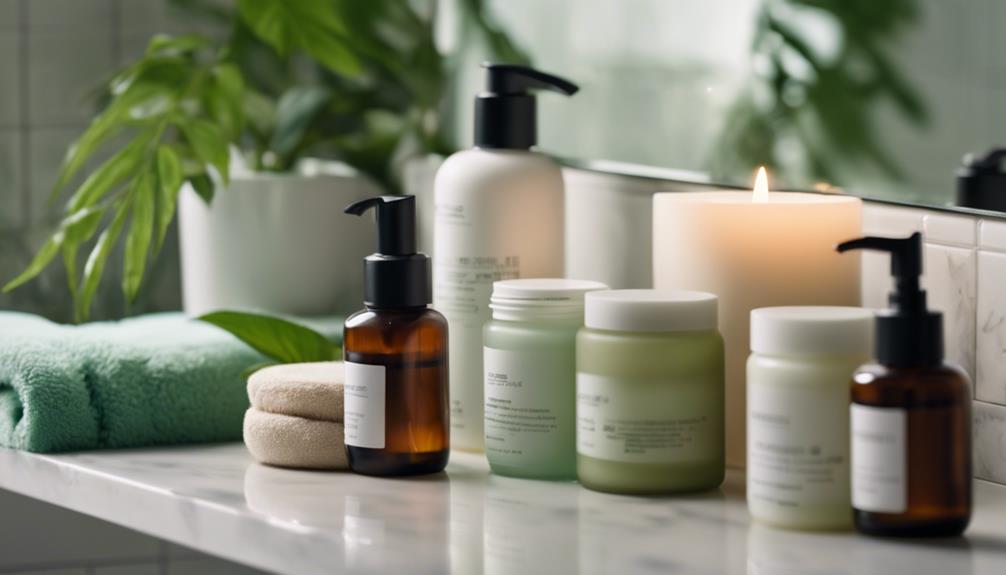
When tackling acne, using effective skincare products with proven ingredients can make a significant difference in your routine. Start by incorporating acne-fighting ingredients like salicylic acid and benzoyl peroxide. Salicylic acid helps dissolve oil and dead skin cells, while benzoyl peroxide targets acne-causing bacteria directly.
Here's a quick overview of some effective products:
| Product | Key Benefits |
|---|---|
| CeraVe PM Facial Moisturizing Lotion | Hydrates and restores the skin barrier with ceramides and hyaluronic acid. |
| Adapalene (over-the-counter) | Accelerates skin cell turnover and improves texture. |
| Non-comedogenic Moisturizers | Hydrates without clogging pores, using glycerin or hyaluronic acid. |
Consistent use of these effective skincare products in a structured routine can lead to visible improvements in your skin within 4 to 12 weeks. Remember, the right combination of ingredients not only fights acne but also hydrates your skin, supporting its barrier function. So, choose wisely and stick to your routine!
Recommended Morning Routine
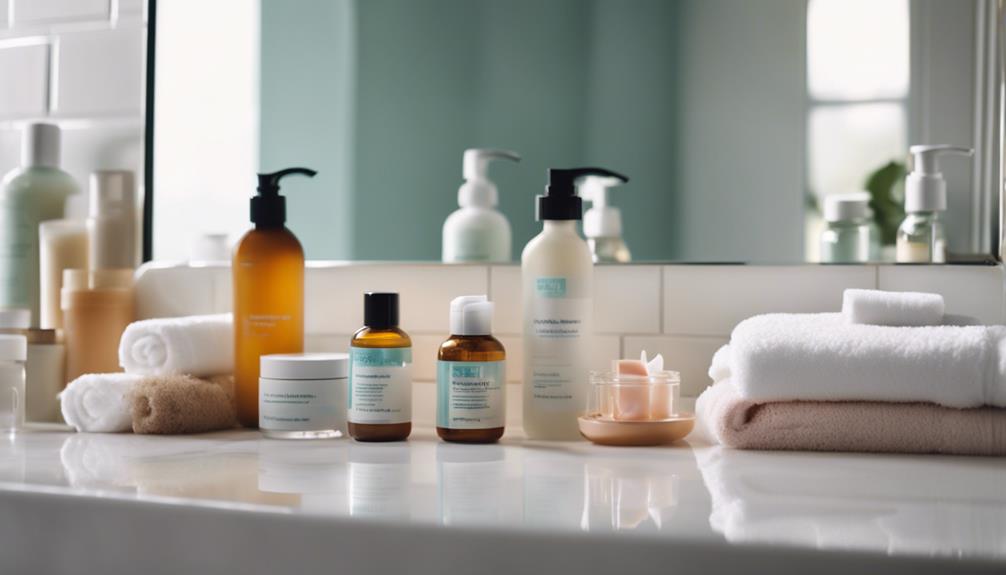
Kick off your morning routine with a gentle cleanser like CeraVe Acne Foaming Cream Cleanser to effectively remove dirt and excess oil while targeting acne.
This cleanser contains benzoyl peroxide, which helps dissolve impurities and combat breakouts right from the start.
After cleansing, apply a targeted acne treatment to focus on problem areas. Look for ingredients like salicylic acid or more benzoyl peroxide for ideal results.
Next, keep your skin hydrated with an oil-free moisturizer. The CeraVe AM Facial Moisturizing Lotion is a great choice, as it includes hyaluronic acid and essential ceramides to support your skin barrier while maintaining moisture.
Finally, don't forget the broad-spectrum sunscreen with at least SPF 30. Protecting your skin from UV damage is essential, as it helps prevent post-acne scarring and maintains overall skin clarity.
Consistency in your morning skincare routine is critical. By regularly using these products, you'll see significant improvements in your skin clarity and effectively prevent breakouts.
Stick to this regimen, and you'll be on your way to clearer, healthier skin.
Recommended Night Routine
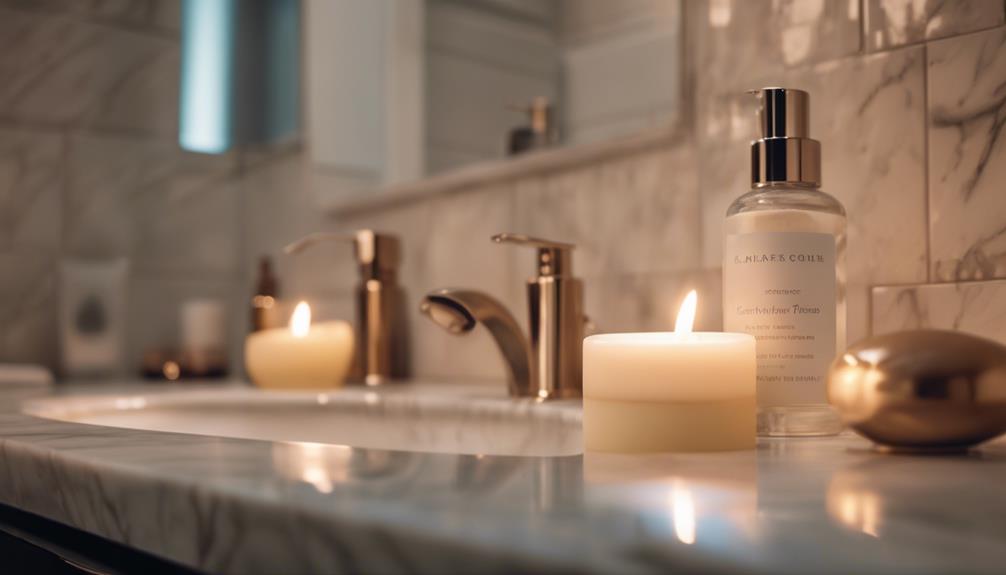
Start your night routine by cleansing with a gentle, non-irritating cleanser to remove makeup, oil, and debris, which helps prevent new breakouts. The CeraVe Acne Foaming Cream Cleanser is an excellent choice, as it effectively cleanses without irritating your skin.
After cleansing, apply a targeted treatment such as a retinoid like adapalene. This powerful ingredient accelerates skin cell turnover, helping to minimize the appearance of acne and post-acne marks.
Next, follow up with a lightweight, non-comedogenic moisturizer like CeraVe PM Facial Moisturizing Lotion. This product hydrates your skin without clogging pores and contains essential ceramides and niacinamide, which support your skin barrier.
Consistency is key, so make sure to incorporate this routine nightly. Regular use of these products can lead to visible improvements in skin texture and a reduction in acne over time.
Additional Tips for Clear Skin
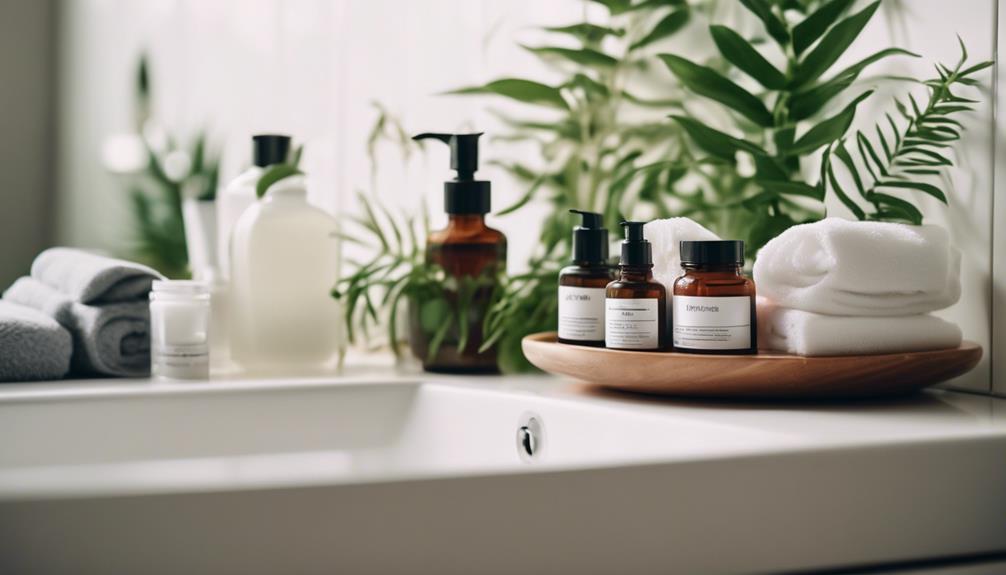
To maintain clear skin, it's important to adopt additional habits that complement your nighttime routine. These simple yet effective steps can help you enhance your acne skincare routine and achieve better results.
- Use Non-Comedogenic Moisturizers: Opt for moisturizers with hyaluronic acid and ceramides to hydrate your skin without clogging pores. This supports your skin barrier and keeps your complexion balanced.
- Apply SPF 30 Daily: Protect your acne-prone skin from UV damage by using a broad-spectrum sunscreen with at least SPF 30. This helps reduce redness and scarring from past breakouts.
- Practice Stress Management: Engage in mindfulness techniques or regular exercise to lower cortisol levels. Reducing stress can help decrease oil production, minimizing the chances of breakouts.
- Limit Bacterial Transfer: Change your pillowcases regularly and avoid touching your face to considerably cut down on bacteria and dirt that can prevent new acne.
Resources for Acne Management
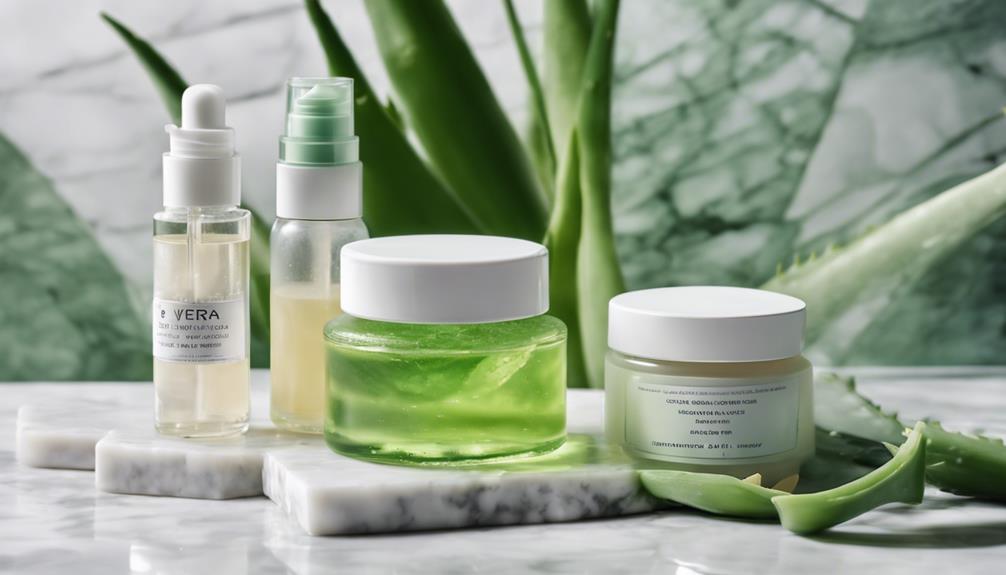
Accessing reliable resources for acne management can empower you to make informed decisions about your skincare routine and treatment options. Organizations like the American Academy of Dermatology provide extensive insights into acne, revealing that around 9.4% of the global population is affected. Understanding the multifaceted nature of acne is vital for effective management.
Use tools like the CeraVe skincare quiz to help identify personalized products suited for your acne-prone skin. This quiz emphasizes the importance of selecting suitable ingredients that cater to your unique needs. Additionally, articles from dermatologists, such as those by Dr. Ted Lain, offer valuable information about different types of acne and effective treatment options.
Mayo Clinic's research highlights how hormonal changes and lifestyle factors can exacerbate acne. By understanding these triggers, you can better manage your skincare routine and make necessary adjustments.
Don't forget to explore online resources for continuous education on new products and skincare tips, which can further aid in your ongoing battle with acne. Utilizing these resources will guide you toward achieving clearer skin and a more effective skincare routine tailored just for you.
Can the Acne Skincare Routine Also Help with Anti-Aging?
Yes, the acne skincare routine can also help combat signs of aging. Using products with ingredients like retinoids and antioxidants can address both acne and aging concerns. By maintaining a consistent skincare routine, you can keep your skin clear and youthful-looking at the same time.
Conclusion
Now that you've revealed the secrets to clear skin, it's time to put your knowledge into action.
Like a gardener tending to their blooms, nurture your skin with consistent care and the right products.
Embrace the rhythm of your morning and night routines, watching your confidence blossom.
Remember, patience is key—healing takes time.
With dedication and these effective steps, you'll cultivate a radiant complexion that shines like the sun on a clear day.
